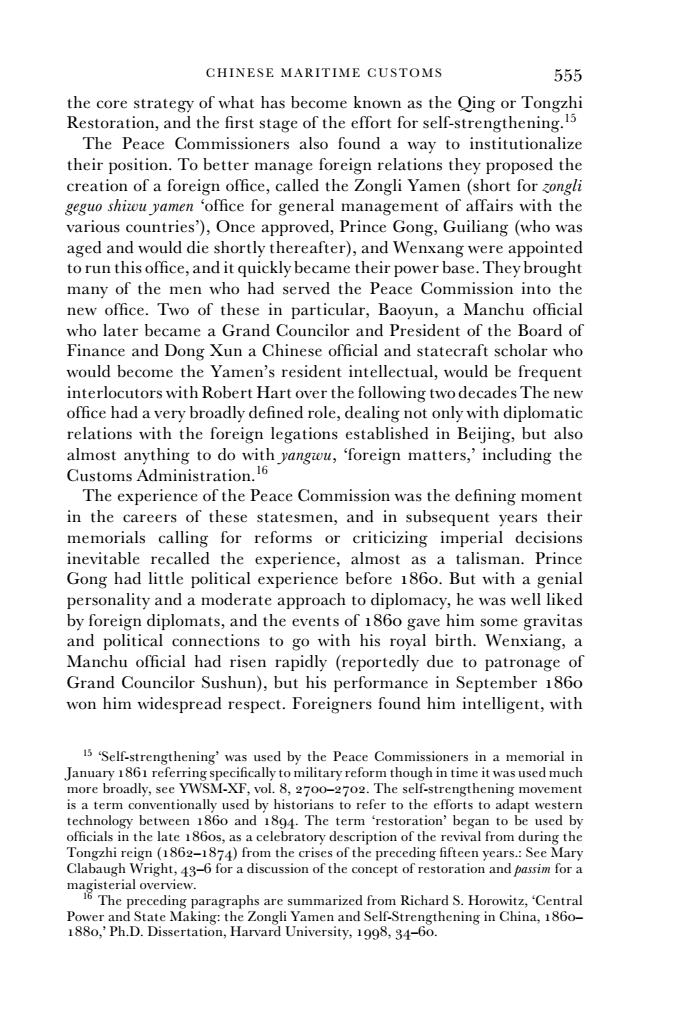正在加载图片...

CHINESE MARITIME CUSTOMS 555 the core strategy of what has become known as the Qing or Tongzhi Restoration,and the first stage of the effort for self-strengthening.15 The Peace Commissioners also found a way to institutionalize their position.To better manage foreign relations they proposed the creation of a foreign office,called the Zongli Yamen (short for zongli geguo shiwou yamen 'office for general management of affairs with the various countries),Once approved,Prince Gong,Guiliang (who was aged and would die shortly thereafter),and Wenxang were appointed to run this office,and it quickly became their power base.They brought many of the men who had served the Peace Commission into the new office.Two of these in particular,Baoyun,a Manchu official who later became a Grand Councilor and President of the Board of Finance and Dong Xun a Chinese official and statecraft scholar who would become the Yamen's resident intellectual,would be frequent interlocutors with Robert Hart over the following two decades The new office had a very broadly defined role,dealing not only with diplomatic relations with the foreign legations established in Beijing,but also almost anything to do with yangwu,'foreign matters,'including the Customs Administration.16 The experience of the Peace Commission was the defining moment in the careers of these statesmen,and in subsequent years their memorials calling for reforms or criticizing imperial decisions inevitable recalled the experience,almost as a talisman.Prince Gong had little political experience before 1860.But with a genial personality and a moderate approach to diplomacy,he was well liked by foreign diplomats,and the events of 1860 gave him some gravitas and political connections to go with his royal birth.Wenxiang,a Manchu official had risen rapidly (reportedly due to patronage of Grand Councilor Sushun),but his performance in September 1860 won him widespread respect.Foreigners found him intelligent,with 15Self-strengthening'was used by the Peace Commissioners in a memorial in January 1861 referring specifically to military reform though in time it was used much more broadly,see YWSM-XF,vol.8,2700-2702.The self-strengthening movement is a term conventionally used by historians to refer to the efforts to adapt western technology between 1860 and 1894.The term 'restoration'began to be used by officials in the late 186os,as a celebratory description of the revival from during the Tongzhi reign (1862-1874)from the crises of the preceding fifteen years.:See Mary Clabaugh Wright,43-6 for a discussion of the concept of restoration and passim for a magisterial overview. 16 The preceding paragraphs are summarized from Richard S.Horowitz,Central Power and State Making:the Zongli Yamen and Self-Strengthening in China,1860- 1880,'Ph.D.Dissertation,Harvard University,1998,34-60.CHINESE MARITIME CUSTOMS 555 the core strategy of what has become known as the Qing or Tongzhi Restoration, and the first stage of the effort for self-strengthening.15 The Peace Commissioners also found a way to institutionalize their position. To better manage foreign relations they proposed the creation of a foreign office, called the Zongli Yamen (short for zongli geguo shiwu yamen ‘office for general management of affairs with the various countries’), Once approved, Prince Gong, Guiliang (who was aged and would die shortly thereafter), and Wenxang were appointed to run this office, and it quickly became their power base. They brought many of the men who had served the Peace Commission into the new office. Two of these in particular, Baoyun, a Manchu official who later became a Grand Councilor and President of the Board of Finance and Dong Xun a Chinese official and statecraft scholar who would become the Yamen’s resident intellectual, would be frequent interlocutors with Robert Hart over the following two decades The new office had a very broadly defined role, dealing not only with diplomatic relations with the foreign legations established in Beijing, but also almost anything to do with yangwu, ‘foreign matters,’ including the Customs Administration.16 The experience of the Peace Commission was the defining moment in the careers of these statesmen, and in subsequent years their memorials calling for reforms or criticizing imperial decisions inevitable recalled the experience, almost as a talisman. Prince Gong had little political experience before 1860. But with a genial personality and a moderate approach to diplomacy, he was well liked by foreign diplomats, and the events of 1860 gave him some gravitas and political connections to go with his royal birth. Wenxiang, a Manchu official had risen rapidly (reportedly due to patronage of Grand Councilor Sushun), but his performance in September 1860 won him widespread respect. Foreigners found him intelligent, with 15 ‘Self-strengthening’ was used by the Peace Commissioners in a memorial in January 1861 referring specifically to military reform though in time it was used much more broadly, see YWSM-XF, vol. 8, 2700–2702. The self-strengthening movement is a term conventionally used by historians to refer to the efforts to adapt western technology between 1860 and 1894. The term ‘restoration’ began to be used by officials in the late 1860s, as a celebratory description of the revival from during the Tongzhi reign (1862–1874) from the crises of the preceding fifteen years.: See Mary Clabaugh Wright, 43–6 for a discussion of the concept of restoration and passim for a magisterial overview. 16 The preceding paragraphs are summarized from Richard S. Horowitz, ‘Central Power and State Making: the Zongli Yamen and Self-Strengthening in China, 1860– 1880,’ Ph.D. Dissertation, Harvard University, 1998, 34–60